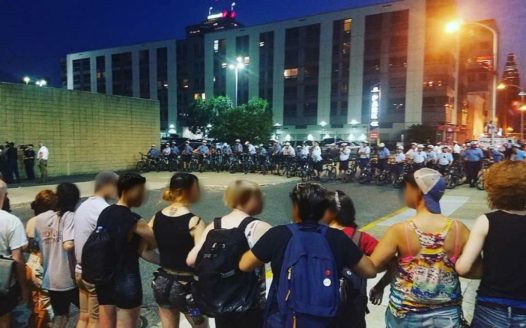
Power has a way of co-opting the subversive for its own stability. The teachings of Jesus, an anti-imperialist prophet, included. Within a few centuries, Christ’s communities of holy fools and prophets ossified into a vehicle of imperial power, playing a vital role in historical and contemporary colonialism. Today, Christian institutions are globally advocating for right-wing reactionary ideologies. Christianity has materially and historically proven itself to have a devastatingly synergistic relationship with imperialism, capitalism, white supremacy, and cisheteropatriarchy. For those of us who are Christians with revolutionary anti-capitalist convictions, we are responsible for working through these contradictions for the sake of reparations. U.S. and White Christians are especially called to take responsibility for the sins of their tradition and institutions, working out their salvation in fear and trembling with the knowledge that the sins of the Church are insurmountable.
The Friendly Fire Collective has a number of Christian members currently working through these contradictions. We have been asking ourselves what discipleship in Christ looks like in the context of the US, where Christendom is losing its grip but Christian hegemony remains.
For those not acquainted with our community, Friendly Fire is a network of individuals, cells, and communities who seek to accompany revolutionary and liberatory currents as people of faith. Originally a collective of far left Quakers, we re-oriented our mission early on to include mystics of all faith traditions, including outside Christianity. Though our network is national, our “base” is in Philadelphia, where we have a community focused on anti-imperialist discipleship.
As a community with an apocalyptic vision, we believe that today’s global political crises are connected and reveal the imperialist order collapsing on us. The last days are here—the world as we know it is coming to an end—and we must build a new world in the ashes of the old. The masses are being called to enact God’s transformative judgment in this world, tearing the mighty off their thrones and lifting up the oppressed. We believe this is essential to the gospel of Jesus.
Though the institutional Church widely dismisses and even combats the political convictions of our community, we look to the witnesses of the Taborites, Beguines and Beghards, early Quakers, militant Anabaptists, Liberation Theology-inspired Christian base communities, the Christians for National Liberation in the Philippines, and other communities and prophets on the outskirts of Christendom that found subversive power in Christ’s gospel. Prophetic communities have periodically popped up throughout history to reveal the sins of the State Church, and to proclaim and demonstrate a different way of following Christ that is egalitarian, communal, Spirit-driven, and against the cruelty and nonsense of the status quo. Many of them tended to retreat from the world, creating isolated communities of mutual aid, spiritual presence, and committed agape love. Other communities, like those who followed the early radical reformer Thomas Müntzer, were grounded in the experience of God and a profoundly political narrative of the apocalypse, feeling that Christ himself invited them to be disciples through the class struggle. This form of political discipleship laid ground for the German Peasants’ War.
As Christians who seek the death of empire, we take comfort that we are not alone, and millions of others who followed Jesus sought the same thing.
We especially look to the example of Christians like Camilo Torres Restrepo, who famously remarked, “If Jesus were alive today, He would be a guerrillero.” He followed Jesus out of the priesthood and academia, and into the revolutionary struggle, joining the National Liberation Army in Colombia. He was shamelessly a Christian Marxist, and provided spiritual support to his comrades. He was martyred in his first experience of combat. His life embodies the gospel our Christian members believe.
In the context of the US, we understand that essential to our discipleship in Christ is combating Christian hegemony. We see an emerging strategy in the Christian/Religious Left forming, which we tend to call “religion for the commune,” that expounds on this mission. This strategy calls us to orient our spiritual lives, as individuals and as spiritual communities, around accompanying liberatory currents. As people of faith, we feel called to be present to the revolutionary process, seeing the political struggle as a spiritual struggle. The love of God dares us to follow empathy into its most radical leadings, including to revolt against a world built on the exploitation of the masses. We hope to corporately participate in the revolutionary struggle, as well as be present to the spiritual needs of the growing revolutionary movement, creating spaces of prayer, contemplation and pastoral care. Through this work of accompaniment, we intend on modeling a new way of being a spiritual community. We can form a theology and practice built from and for the people.
Spiritual practices are a gift to disciples, transforming affinity groups into disciplined revolutionaries, and they can be a gift to the forming Commune. But we should offer these spaces for healing, contemplation, and spiritual practice with the Commune in mind, never centering our spiritual affinity groups or in any way replicating the dynamics of imperialist Christianity. When we join our faith to the Commune, we can discover with the people how to love and serve God, and even how to be disciples of Christ.